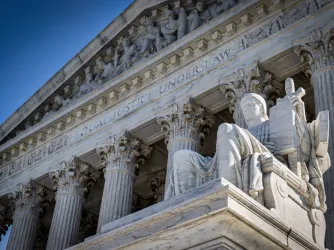Table of Contents
Protestors lose their marbles — literally — as Matt Walsh speaks at UIowa

Joseph Cress / Iowa City Press-Citizen / USA TODAY NETWORK
Transgender-rights protesters march in the intersection of Jefferson and Madison Streets blocking traffic as Matt Walsh speaks at an event hosted by the Young America's Foundation on Wednesday, April 19, 2023, at the Iowa Memorial Union on the University of Iowa campus in Iowa City.
Here at FIRE, the protocol for a Matt Walsh speaking event is one with which we’ve become quite familiar: Monitor the event, watch as hecklers try to shut or shout it down, and respond accordingly. Time after time, as administrators fail to do their jobs in securing controversial events and students fail to understand the bounds of protected expression, FIRE is here to remind both parties of their constitutional obligations.
Rinse and repeat.
On Wednesday, Walsh visited the University of Iowa at the invitation of its Young Americans for Freedom chapter, to screen his documentary, “What is a Woman?” After the screening, protesters converged on the building where Walsh was set to address students. The protesters shouted at students in line for the event, filled the hallway with marbles for attendees to trip over, blocked one of the only venue exits, and later blocked the road as cars attempted to leave that evening.
Despite protesters’ efforts, the event proceeded as Walsh spoke to almost 500 attendees.
Earlier this month, word of the attempted shutdown spread across social media. “Don’t let YAF’s hate speech go unfought,” encouraged Antifa Hawkeye Action on posters plastered across campus. “It’s on all of us to make Iowa City unwelcome for bigots.” The posters encouraged protesters to bring masks, banners, signs, air horns, noisemakers.
“So the question becomes,” posited the group on Twitter, “how do we cut them off?” Student organizers also created a petition to have Iowa’s YAF chapter suspended altogether.
Of course, FIRE supports the right of student protesters to engage in protected expression — including by asking tough questions during a Q&A, organizing a counter-event, or demonstrating outside the event. But flooding a hallway with marbles in an apparent effort to injure attendees, or using air horns to drown out a speaker fosters neither a healthy campus environment nor a culture of free expression.
Instead of attending Walsh’s lecture and pressing him with difficult, thought-provoking questions, some of the protesters tried to shut down the event altogether — in direct contravention of his right to speak and of the students’ right to listen.

While calls for unprotected expression like event disruptions are not news to us, and though we’ve recently seen controversial events go much worse, FIRE is disappointed in the university’s leadership for not doing more to ensure the safety of those attending Wednesday night’s event.
As FIRE has said for years, and Nico Perrino argued in The Los Angeles Times last week, substantial disruptions don’t qualify as free speech. Despite the “heckler’s veto” lacking any constitutional justification as a response to objectionable speech, 62% of college students misunderstand the First Amendment and say shouting down a speaker to prevent them from sharing their ideas is acceptable to some degree.

While Walsh’s protesters apparently felt justified in their efforts to shut down what they deem hateful rhetoric, one cannot help but wonder if they’d similarly accept that response the next time one of them invites a speaker to campus that YAF members may vehemently oppose.
FIRE continues to monitor these attempted shut-downs and will return to our playbook, reminding universities and students what is and is not protected expression, as often as necessary.
FIRE defends the rights of students and faculty members — no matter their views — at public and private universities and colleges in the United States. If you are a student or a faculty member facing investigation or punishment for your speech, submit your case to FIRE today. If you’re a faculty member at a public college or university, call the Faculty Legal Defense Fund 24-hour hotline at 254-500-FLDF (3533). If you’re a college journalist facing censorship or a media law question, call the Student Press Freedom Initiative 24-hour hotline at 717-734-SPFI (7734).
Recent Articles
Get the latest free speech news and analysis from FIRE.

The federal charges against Don Lemon raise serious concerns for press freedom

The American people fact-checked their government

California prohibits its teachers from talking about a student's gender identity to their parents. That raises First Amendment concerns.


